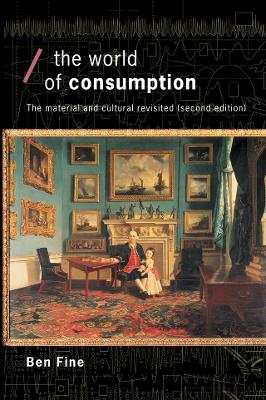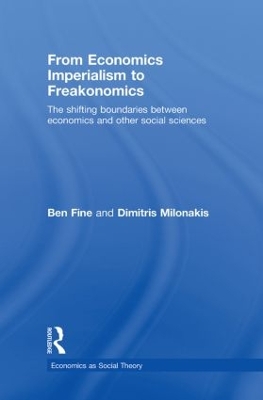Economics as Social Theory
3 total works
Consumption has become one of the leading topics across the social sciences and vocational disciplines such as marketing and business studies. In this comprehensively updated and revised new edition, traditional approaches as well as the most recent literature are fully addressed and incorporated, with wide reference to theoretical and empirical work. Fine's refreshing and authoritative text includes a critical examination of such themes as:
* economics imperialism and globalization
* the world of commodities
* systems of provision and culture
* the consumer society
* public consumption.
This book presents an updated analysis of the cluttered landscape of studies of consumption that will make it required reading for students from a wide range of backgrounds including political economy, history and social science courses generally.
From Economics Imperialism to Freakonomics
by Ben Fine and Dimitris Milonakis
Is or has economics ever been the imperial social science? Could or should it ever be so? These are the central concerns of this book. It involves a critical reflection on the process of how economics became the way it is, in terms of a narrow and intolerant orthodoxy, that has, nonetheless, increasingly directed its attention to appropriating the subject matter of other social sciences through the process termed "economics imperialism". In other words, the book addresses the shifting boundaries between economics and the other social sciences as seen from the confines of the dismal science, with some reflection on the responses to the economic imperialists by other disciplines.
Significantly, an old economics imperialism is identified of the "as if market" style most closely associated with Gary Becker, the public choice theory of Buchanan and Tullock and cliometrics. But this has given way to a more "revolutionary" form of economics imperialism associated with the information-theoretic economics of Akerlof and Stiglitz, and the new institutional economics of Coase, Wiliamson and North. Embracing one "new" field after another, economics imperialism reaches its most extreme version in the form of "freakonomics", the economic theory of everything on the basis of the most shallow principles.
By way of contrast and as a guiding critical thread, a thorough review is offered of the appropriate principles underpinning political economy and its relationship to social science, and how these have been and continue to be deployed. The case is made for political economy with an interdisciplinary character, able to bridge the gap between economics and other social sciences, and draw upon and interrogate the nature of contemporary capitalism.
From Political Economy to Economics
by Professor Ben Fine and Dimitris Milonakis
Economics has become a monolithic science, variously described as formalistic and autistic with neoclassical orthodoxy reigning supreme. So argue Dimitris Milonakis and Ben Fine in this new major work of critical recollection. The authors show how economics was once rich, diverse, multidimensional and pluralistic, and unravel the processes that lead to orthodoxy's current predicament. The book details how political economy became economics through the desocialisation and the dehistoricisation of the dismal science, accompanied by the separation of economics from the other social sciences, especially economic history and sociology. It is argued that recent attempts from within economics to address the social and the historical have failed to acknowledge long standing debates amongst economists, historians and other social scientists. This has resulted in an impoverished historical and social content within mainstream economics.
The book ranges over the shifting role of the historical and the social in economic theory, the shifting boundaries between the economic and the non-economic, all within a methodological context. Schools of thought and individuals, that have been neglected or marginalised, are treated in full, including classical political economy and Marx, the German and British historical schools, American institutionalism, Weber and Schumpeter and their programme of Socialoekonomik, and the Austrian school. At the same time, developments within the mainstream tradition from marginalism through Marshall and Keynes to general equilibrium theory are also scrutinised, and the clashes between the various camps from the famous Methodenstreit to the fierce debates of the 1930s and beyond brought to the fore.
The prime rationale underpinning this account drawn from the past is to put the case for political economy back on the agenda. This is done by treating economics as a social science once again, rather than as a positive science, as has been the inclination since the time of Jevons and Walras. It involves transcending the boundaries of the social sciences, but in a particular way that is in exactly the opposite direction now being taken by "economics imperialism". Drawing on the rich traditions of the past, the reintroduction and full incorporation of the social and the historical into the main corpus of political economy will be possible in the future.


